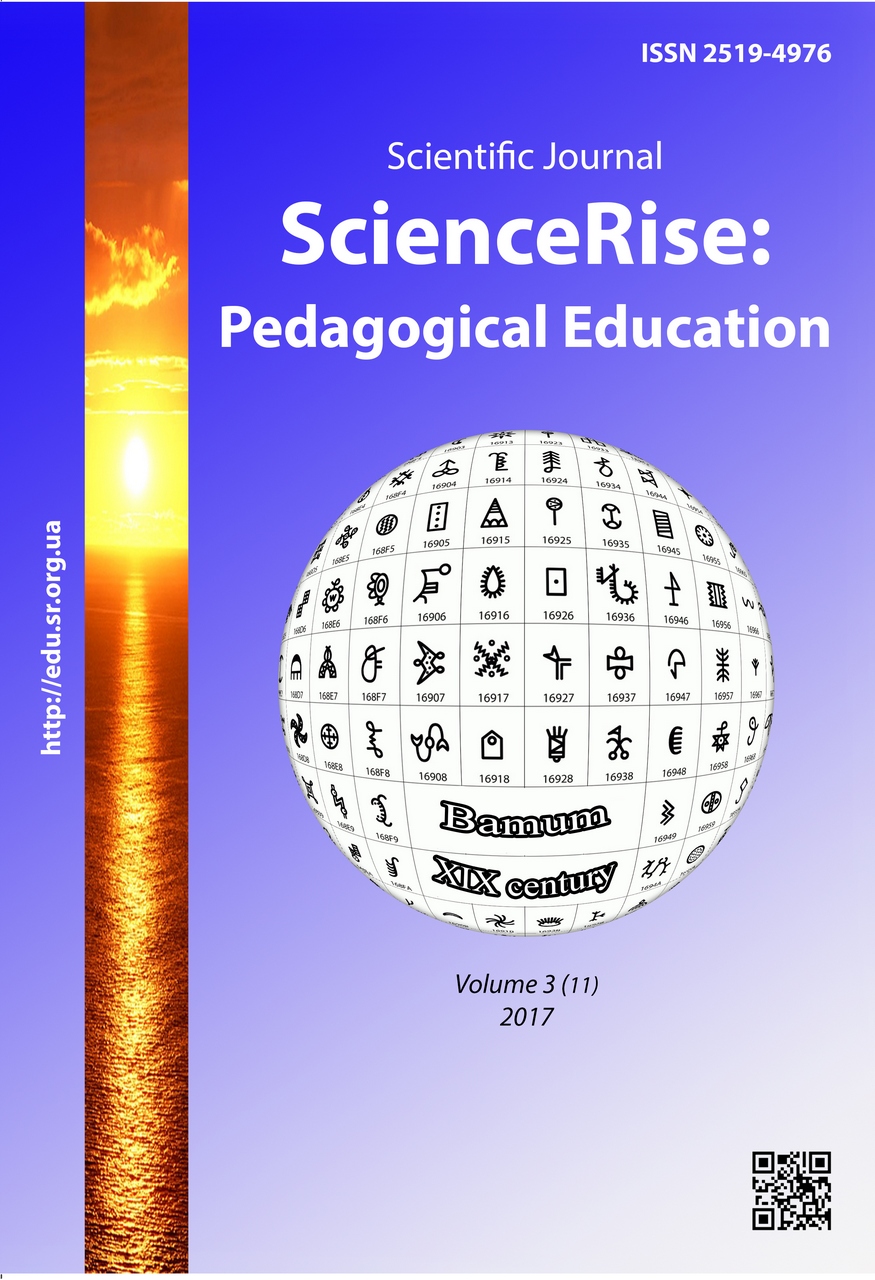Analysis of the results of pedagogical experiment on development of culture-creating competence in teachers-humanitarians of military higher educational institutions of Ukraine
DOI:
https://doi.org/10.15587/2519-4984.2017.97176Keywords:
experimental-research teaching, culture-creating competence, case-technology, post-graduate pedagogical education, program of pedagogical experimentAbstract
The article analyzes the course and results of experimental-research check of effectiveness of elaborated theoretical model of development of culture-creating competence of teachers-humanitarians of MHEI in the system of post-graduate pedagogical education.
The theoretical model of development of culture-creating competence of military higher school teachers was grounded and elaborated using case-technology. The psychological-pedagogical conditions of development of culture-creating competence of MHEI teachers-humanitarians were determined. The logic, organizational features and course of pedagogical experiment at each its stage were elucidated, the results of experimental-research teaching were generalized. The conclusions of the study were made; the prospects of further study of considered scientific question were indicated.
It was established, that culture-creating competence of MHEI teachers-humanitarians is manifested in their readiness for productive pedagogical activity, subject-subject interaction with pupils on the base of acquired totality of culturological knowledge, skills, esthetic experience, humanistic ideals and values, creative abilities and talent of co-creative activity that is remarkable for dynamic character and need permanent deepening, widening, renewal, practical training.
Introduction of the author’s model of culture-creating competence development of MHEI teachers-humanitarians using case-technology allows essentially optimize post-graduate training (re-training), qualification improvement of teachers of military higher school.
The prospects for further elaboration of considered scientific question that are in substantiation and projecting of new case typology, creation of case “battery” on topical pedagogical problems, study of the ways of integration of case-technology with interactive technologies of cooperated, communicative-dialogue, playing study were determined
References
- Vitchenko, A. O. (2014). Rozvytok profesiynoyi kompetentnosti maybutnikh vykladachiv VVNZ iz vykorystannyam tekhnolohiyi sytuatyvnoho analizu. Visnyk Natsional'noho universytetu oborony Ukrayiny, 1 (38), 20–26.
- Vitchenko, A. O., Os'odlo, V. I., Salkutsan, S. M.; Telelym, V. M. (Ed.) (2016). Tekhnolohiyi navchannya u vyshchiy viys'koviy shkoli: teoriya i praktyka. Kyiv: NUOU im. Ivana Chernyakhovs'koho, 250.
- Zyazyun, I. A. (1996). Osvitni tekhnolohiyi u vymirakh pedahohichnoyi refleksiyi. Postmetodyka, 4 (14), 11–13.
- Dubasenyuk, O. A., Semenyuk, T. V., Antonova, O. Ye. (2003). Profesiyna pidhotovka maybutn'oho vchytelya do pedahohichnoyi diyal'nosti. Zhytomyr: Zhytomyrs'kyy derzh. ped. un-t, 192.
- Okon', V.; Danilov, M. A. (Ed.) (1962). Process obucheniya. Moscow: Uchpedgiz, 172.
- Os'odlo, V. I. (2012). Psykholohiya profesiynoho stanovlennya ofitsera. Kyiv: PP «Zoloti Vorota», 463.
- Sysoyeva, S. O. (2011). Interaktyvni tekhnolohiyi navchannya doroslykh. Kyiv: VD «EKMO», 320.
- Zamotayeva, N. V. (2016). Osoblyvosti vykorystannya keysiv u protsesi rozvytku kul'turotvorchoyi kompetentnosti vykladachiv VVNZ. Visnyk Natsional'noho aviatsiynoho universytetu. Seriya: Pedahohika. Psykholohiya, 1 (8), 36–42.
- Zamotayeva, N. V. (2016). Kul'turolohichne zabezpechennya viys'kovo-pedahohichnoho protsesu z vykorystannyam keys-tekhnolohiyi. Kyiv: Al'fa Reklama, 180.
- Zamotayeva, N. V. (2014). Praktychne vykorystannya tekhnolohiyi sytuatyvnoho analizu na zanyattyakh riznykh vydiv. Vykorystannya metodiv aktyvnoho navchannya u navchal'no-vykhovnomu protsesi pidhotovky ofitseriv zapasu, 156–158.
- Psihologo-pedagogicheskij praktikum rotnogo politrabotnika. Chep. ІІ (1989). Voennaya pedagogika. Doneck, 366.
Downloads
Published
How to Cite
Issue
Section
License
Copyright (c) 2017 Nataliia Zamotaieva

This work is licensed under a Creative Commons Attribution 4.0 International License.
Our journal abides by the Creative Commons CC BY copyright rights and permissions for open access journals.
Authors, who are published in this journal, agree to the following conditions:
1. The authors reserve the right to authorship of the work and pass the first publication right of this work to the journal under the terms of a Creative Commons CC BY, which allows others to freely distribute the published research with the obligatory reference to the authors of the original work and the first publication of the work in this journal.
2. The authors have the right to conclude separate supplement agreements that relate to non-exclusive work distribution in the form in which it has been published by the journal (for example, to upload the work to the online storage of the journal or publish it as part of a monograph), provided that the reference to the first publication of the work in this journal is included.







